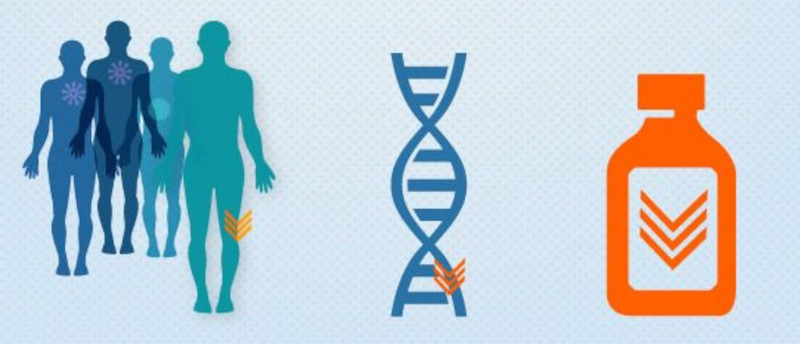ECOG-ACRIN opens a new NCI-MATCH treatment arm for dMMR and LAG-3-positive cancers as it continues to locate patients with BRAF mutations

Image Credit: National Cancer Institute. No restrictions.
The landmark NCI-MATCH precision medicine cancer trial continues to offer treatment opportunities. Two treatment arms are open while others are now closed to enrollment. Multiple journals are expected to publish the results of individual treatment arms.
Philadelphia, March 16, 2022 — The groundbreaking NCI-MATCH trial continues to offer treatment opportunities for adult patients with relapsed, refractory cancers. A new treatment arm (Z1M) is evaluating the immunotherapy combination of relatlimab and nivolumab. It is for patients whose tumors have DNA mismatch repair deficiency (dMMR) and LAG-3 expression and have progressed after anti–PD-1/PD-L1 immunotherapy. In addition, researchers continue to seek patients with BRAF mutations to assess the combination of dabrafenib and trametinib, both targeted therapies (Arm H). NCI-MATCH already showed the activity of this combination across a broad range of cancer types in a first cohort of patients, and is now seeking additional patients to confirm these initial positive results. Together, the two treatment arms seek to enroll 85 patients.
 "These two highly-focused arms illustrate the ability of precision medicine trials to be nimble in response to positive findings, and to develop positive efficacy signals into studies that have the potential to change clinical practice,” said Peter J. O'Dwyer, MD (pictured), group co-chair of the ECOG-ACRIN Cancer Research Group, which is co-leading the trial with the National Cancer Institute.
"These two highly-focused arms illustrate the ability of precision medicine trials to be nimble in response to positive findings, and to develop positive efficacy signals into studies that have the potential to change clinical practice,” said Peter J. O'Dwyer, MD (pictured), group co-chair of the ECOG-ACRIN Cancer Research Group, which is co-leading the trial with the National Cancer Institute.
NCI-Molecular Analysis for Therapy Choice (NCI-MATCH or EAY131) is the first and largest basket trial in precision medicine for cancer. Its primary aim is to establish whether patients with advanced cancer derive clinical benefit from treatments that target a molecular feature regardless of where cancer occurs in the body. The trial assesses a range of nearly 40 unique molecular targets and corresponding drugs. These matches were selected based on early evidence of potential effectiveness. However, most of the data are from trials in single cancer types.
Each NCI-MATCH arm—and every patient who participates—provide valuable information on potential cancer treatments. So far, nearly 1,200 patients have received treatment, representing multiple cancer types. Most have uncommon or rare cancers—diseases other than breast, colorectal, non-small cell lung, or prostate cancer.
Most NCI-MATCH treatment arms are now closed to patient enrollment and are in follow-up. Multiple journals have published results for individual treatment arms. Others are to come on a rolling basis. The publications contain patient outcomes, detailed genomic analyses, and conclusions drawn from this information.
As researchers delve into the genomic features of each patient, they are uncovering valuable new information on responsive versus unresponsive tumors, especially in rare cancers where there are often no effective treatments. Signals of effectiveness will merit future examination in other trials beyond NCI-MATCH. They are also discovering how drugs that target a specific mutation perform in patients with other co-existing mutations. Such discoveries may reveal opportunities to explore new drug combinations.
“The emergence of these two combination arms to represent the culmination of research in NCI-MATCH is no accident, and has arisen organically from the aggregated results of the trial to date,” said Dr. O’Dwyer.
NCI-MATCH Knowledge Base for Future Precision Medicine Trials
At the time of development, the size and scope of the NCI-MATCH trial had never before been attempted. For the NCI and ECOG-ACRIN, it was an enormous undertaking to develop the infrastructure for a national precision medicine trial across all cancers. Ultimately, NCI-MATCH is a demonstration of leadership and cooperation among the NCI, the NCI Clinical Trials Network (NCTN) cooperative groups, pharmaceutical and biotechnology companies, genomic testing laboratories, participating clinical sites, and physicians.
“The depth and breadth of expertise among the investigators and staff involved in NCI-MATCH is unprecedented and includes hundreds of translational scientists, clinical oncologists, community practitioners, and research personnel all with deep experience in clinical trials,” said Dr. O’Dwyer.
NCI-MATCH has built a knowledge base and laid the groundwork for future precision medicine initiatives in several areas that are defined in several publications, and summarized here:
- Established the proportion of relapsed, refractory cancers of various histologies that may respond to drugs targeted to molecular alterations (Flaherty KT. J Natl Cancer Inst. January 2020)
- Set benchmarks for the utility of next-generation sequencing in clinical trials (Flaherty KT, J Clin Oncol. October 2020)
- Demonstrated the broad interest among physicians (the trial is open at more than 1,100 hospitals and cancer centers nationwide)
- Developed a pathway for patients to enter the trial using standard tumor gene tests ordered by physicians to guide clinical care (no new biopsy needed for eligibility determination), and designated nearly 30 commercial and academic laboratories to participate
- Proved that tumor testing by many laboratories is an effective way to identify patients, evidenced by a high concordance rate between external lab assays and the central assay
- For rare cancers, showed that a precision medicine trial across all cancers is an effective way to study uncommon diseases, by exceeding expectations in the enrollment of these patients
- Defined ‘precision’ (O'Sullivan Coyne G. Curr Probl Cancer. May-June 2017)
- Developed a central assay platform with a commercial partner
- Set considerations for central assays in future trials (Lih CJ. J Mol Diagn. March 2017)
- Established a validated computational platform (MATCHbox) for treatment allocation
- Validated immunohistochemical assays for integral biomarkers (Koury JD. Clin Cancer Res. February 2018)
 "NCI-MATCH is influencing how cancer clinical trials will be designed and conducted in the future," said Lyndsay Harris, MD (pictured), a medical oncologist at the NCI, Associate Director of the NCI's Cancer Diagnosis Program, and NCI study co-chair for the overall NCI-MATCH trial.
"NCI-MATCH is influencing how cancer clinical trials will be designed and conducted in the future," said Lyndsay Harris, MD (pictured), a medical oncologist at the NCI, Associate Director of the NCI's Cancer Diagnosis Program, and NCI study co-chair for the overall NCI-MATCH trial.
Treatment Opportunity for Patients with dMMR and LAG-3 Expression
Arm Z1M is evaluating the two-drug immunotherapy combination, relatlimab plus nivolumab, in patients whose cancer has progressed after treatment with anti–PD-1/PD-L1 immunotherapy. To be eligible, patients must have DNA mismatch repair deficiency (dMMR) on genomic testing and tumors that express LAG-3.
 "Multiple trials have shown exciting and compelling responses for patients who have DNA mismatch repair deficiency who are treated with PD-1 inhibitors, including pembrolizumab and nivolumab. But, unfortunately, half of the patients won't respond or will progress when they are on therapy," said lead investigator Nilofer Azad, MD (pictured) from Johns Hopkins University.
"Multiple trials have shown exciting and compelling responses for patients who have DNA mismatch repair deficiency who are treated with PD-1 inhibitors, including pembrolizumab and nivolumab. But, unfortunately, half of the patients won't respond or will progress when they are on therapy," said lead investigator Nilofer Azad, MD (pictured) from Johns Hopkins University.
However, recent data suggest that LAG-3 inhibition may restore anti–PD-1 sensitivity.
Patients with melanoma are not eligible for Arm Z1M. The exclusion is based on the phase 3 RELATIVITY-047 trial results, which found that progression-free survival increased significantly when relatlimab was added to nivolumab in patients with advanced melanoma. The US FDA is conducting a priority review of the relatlimab-nivolumab combination to treat patients with unresectable or metastatic melanoma.
Treatment Opportunity for BRAF-Mutated Cancers
Arm H is investigating the combination of the selective BRAF inhibitor dabrafenib and the MEK1/2 inhibitor trametinib in patients whose tumors harbor BRAF V600E or BRAF V600K mutations. A promising efficacy signal in the first group of NCI-MATCH patients to receive this treatment led to the opening of an expansion cohort. The initial study met its primary endpoint with an overall objective response rate of 38 percent in a heavily pre-treated cohort of 17 distinct tumor types—several rare—with BRAF mutations (Salama AKS. J Clin Oncol. August 2020).
 "NCI-MATCH's Arm H shows promising activity outside of currently approved FDA indications," said lead researcher April K.S. Salama, MD (pictured) from Duke University. “So far, the data show that BRAF/MEK combination therapy has widespread activity across multiple cancer types whose tumors harbor BRAF mutations. Therefore, we hope to identify 50 more patients for Arm H to define the broad applicability of these positive findings.”
"NCI-MATCH's Arm H shows promising activity outside of currently approved FDA indications," said lead researcher April K.S. Salama, MD (pictured) from Duke University. “So far, the data show that BRAF/MEK combination therapy has widespread activity across multiple cancer types whose tumors harbor BRAF mutations. Therefore, we hope to identify 50 more patients for Arm H to define the broad applicability of these positive findings.”
Acknowledgments
NCI-MATCH is sponsored by the NCI, part of the National Institutes of Health. ECOG-ACRIN is co-leading the trial with NCI. Other NCI-funded network groups are participating. These groups include the Alliance for Clinical Trials in Oncology, Children’s Oncology Group, NRG Oncology, and SWOG Cancer Research Network. Bristol Myers Squibb and Novartis provided support to Arms Z1M and H through their respective agreements with the NCI.
###
